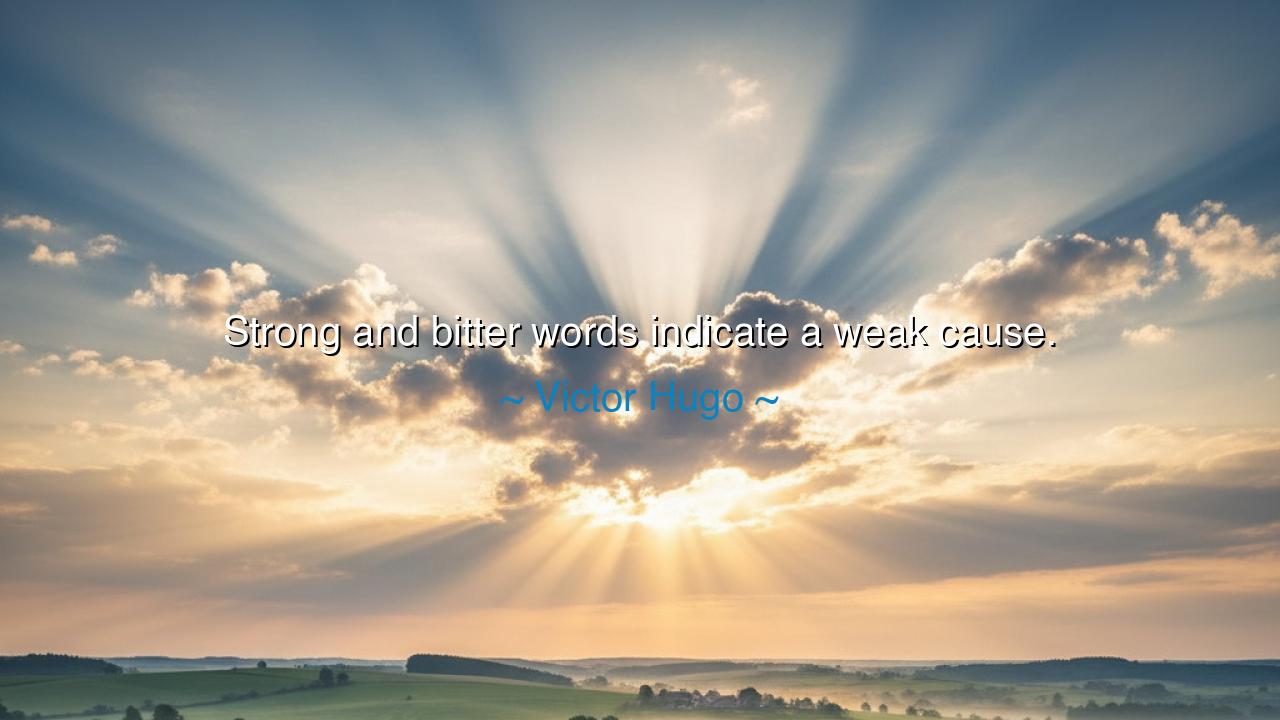
Strong and bitter words indicate a weak cause.






Victor Hugo, the great poet of liberty and conscience, once spoke with piercing clarity: “Strong and bitter words indicate a weak cause.” In these words he revealed a truth older than the stones of the forum: that those who rely on fury, insult, and venom in their speech do so because reason is not on their side. For when truth stands firm, it needs no bitterness; when justice is unshakable, it speaks with calm authority. It is only the feeble, the uncertain, the hollow, that cloak themselves in thunderous rage and sharpened words, as though noise could make frailty into strength.
The ancients knew this law well. Socrates, in the markets of Athens, stood before men who mocked and slandered him, yet he spoke with calm reason, his words gentle but unyielding. Those who could not match his wisdom resorted to accusations and anger, proving not their strength but the weakness of their cause. Cicero too, in his orations, warned that the shrillness of an argument was often the measure of its emptiness. Thus Hugo’s voice continues their chorus: anger in speech often betrays the weakness of thought.
History offers us vivid testimony. Consider the debates between Abraham Lincoln and Stephen Douglas. Douglas, when cornered, often thundered with bitterness, appealing to fear and prejudice. Lincoln, though passionate, spoke steadily, weaving reason with humility. In the end, it was Lincoln’s calm conviction that prevailed, for truth did not require rage to defend it. Here we see Hugo’s wisdom alive in the fire of history: the stronger the truth, the quieter its tone; the weaker the cause, the harsher its cry.
Or think of Mahatma Gandhi, who faced the British Empire with words of peace and reason. His enemies hurled bitter insults, portraying him as foolish, dangerous, or unworthy. Yet Gandhi’s quiet words, born of conviction and truth, moved millions. The bitterness of his opponents revealed the weakness of their position, while his calm endurance revealed the strength of his cause. Those who rage without reason confess their defeat even as they speak.
This teaching strikes deep into the heart of human conduct. For in our own lives, how often do we meet disputes with sharp tongues, believing anger gives weight to our words? And yet, every bitter outburst is but a sign that we fear our reason is not enough. To master speech, to temper passion with discipline, is to show true strength. The warrior who shouts wildly on the battlefield has already betrayed his fear; the warrior who fights in silence terrifies his enemy.
The wisdom of Hugo is therefore a warning: beware of the man who must scream to be heard. Beware also in yourself when your words turn bitter. For it may mean not that your cause is noble, but that it is frail. Truth is like a mountain—it does not need to shout to be seen. Lies are like shadows—they must grow loud, for they cannot endure the light.
The lesson is this: when you speak, let your words be strong but not bitter, clear but not cruel. Rely on truth, not venom. If you feel compelled to thunder with anger, pause and ask: am I defending truth, or hiding weakness? To win by rage is to lose in silence; to win by truth is to triumph forever.
Practical action flows from this: discipline your tongue. In debate, speak calmly, for calmness is a cloak of strength. When you hear bitterness in others, discern whether it masks a weak cause. And when you are tempted to lash out in rage, remember Victor Hugo’s wisdom: strong and bitter words betray weakness—while reason, patience, and quiet conviction reveal the strength of truth.






AAdministratorAdministrator
Welcome, honored guests. Please leave a comment, we will respond soon